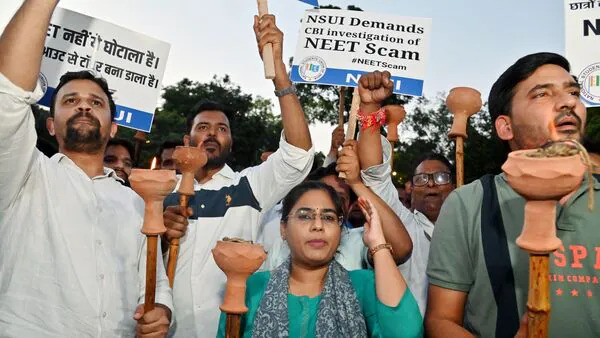In a significant breakthrough in the NEET-UG paper leak case, the Central Bureau of Investigation (CBI) has arrested a father-son duo from the districts of Nalanda and Gaya in Bihar. This development underscores the challenges faced in maintaining the integrity of competitive examinations in India and highlights the rigorous efforts of law enforcement agencies to uphold fairness and transparency.
The Incident
The NEET-UG (National Eligibility cum Entrance Test-Undergraduate) is a highly competitive examination that determines admission to medical colleges across India. Any compromise in its integrity can have far-reaching consequences for thousands of aspiring doctors. The paper leak scandal came to light following allegations that the examination papers had been accessed and distributed before the test date, potentially giving unfair advantage to certain candidates.
The Arrests
The CBI’s investigation led to the arrest of the father-son duo, who were allegedly involved in the orchestrating the leak. The father, a seasoned educator with deep connections in the education sector, and his son, a recent NEET-UG candidate, were found to have played pivotal roles in accessing and distributing the examination papers.
According to the CBI, the father used his professional network to obtain the papers, while the son facilitated their distribution among a select group of candidates in exchange for substantial monetary compensation. This illegal operation not only jeopardized the fairness of the examination but also put the future of many hardworking and deserving students at risk.
The Modus Operandi
The investigation revealed a well-organized network that included educators, intermediaries, and candidates. Here’s a look at how the operation was allegedly carried out:
- Access to Question Papers: Using his connections, the father managed to obtain the NEET-UG question papers prior to the examination date.
- Distribution: The son, leveraging his status as a recent NEET-UG candidate, identified and approached potential beneficiaries. The leaked papers were shared with these candidates in exchange for hefty fees.
- Network of Intermediaries: The duo was part of a larger network that facilitated communication and transactions between those involved, ensuring the papers reached the intended recipients without raising immediate suspicion.
Implications for the Education Sector
The NEET-UG paper leak case and subsequent arrests have significant implications for India’s education system:
- Trust and Integrity: Competitive examinations are a cornerstone of India’s educational framework. Incidents like this erode trust in the system, highlighting the need for robust security measures to maintain integrity.
- Fairness and Meritocracy: The fairness of examinations is crucial to ensuring that deserving candidates are rewarded for their hard work. Compromises in examination processes undermine the principle of meritocracy, disadvantaging honest students.
- Regulatory Oversight: The case underscores the importance of stringent regulatory oversight and the need for continuous monitoring to prevent such incidents. Regular audits, enhanced security measures, and stricter penalties for violators are necessary to safeguard the examination process.
Steps Forward
In the wake of the arrests, several measures can be taken to prevent future incidents and restore faith in the examination system:
- Enhanced Security Measures: Implementing advanced security protocols, such as encrypted question papers, secure transportation, and biometric verification, can help prevent leaks.
- Stringent Penalties: Establishing strict penalties for those involved in examination malpractices can act as a deterrent. This includes not only the perpetrators but also any accomplices and beneficiaries.
- Awareness Campaigns: Educating students, parents, and educators about the consequences of participating in examination fraud can reduce the demand for such unethical practices.
- Continuous Monitoring: Regular inspections and audits of the examination process, coupled with real-time monitoring during exams, can help identify and address vulnerabilities.
Sponsored
FACTS Transcripts
Apply for a University document anywhere
https://www.factstranscript.com
Quick Transcripts for popular Universities, check your University name now and get started. We help you to get your transcript application online which is accepted for use of IRCC.
No DD, NO Paperwork. 100% Authentic, Reliable.
FACTS Transcripts Charges · Reviews · Assam Universities · Home · Know your University










